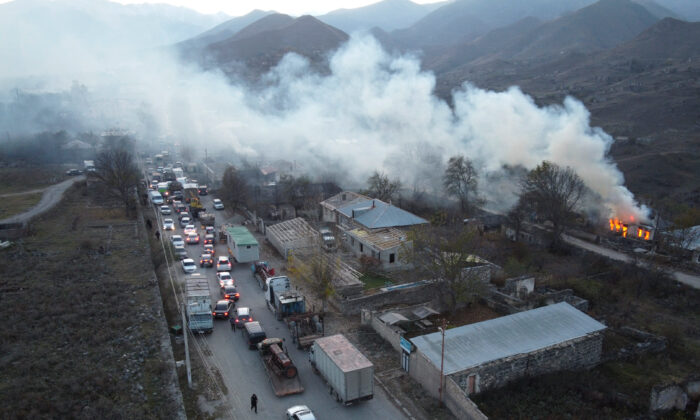MOSCOW—Azerbaijan on Nov. 15 postponed taking control of a territory ceded by Armenian forces in a cease-fire agreement, and denounced civilians leaving the area for burning houses and committing what it called “ecological terror.”
The cease-fire ended six weeks of intense fighting between Azerbaijan and Armenia over the Nagorno-Karabakh region and territories outside its formal borders that had been under the control of Armenian forces since 1994. The agreement calls for Azerbaijan to take control of the outlying territories. The first, Kelbajar, was to be turned over on Nov. 15.
But Azerbaijan agreed to delay the takeover until Nov. 25 after a request from Armenia. Azerbaijani presidential aide Hikmet Hajiyev said worsening weather conditions made the withdrawal of Armenian forces and civilians difficult along the single road through mountainous territory that connects Kelbajar with Armenia.
After the agreement was announced early on Nov. 10, many distraught residents preparing to evacuate set their houses ablaze to make them unusable to Azerbaijanis who would move in.
“Armenians are damaging the environment and civilian objects. Environmental damage, ecological terror must be prevented,” Hajiyev said.
Prior to a separatist war that ended in 1994, Kelbajar was populated almost exclusively by Azerbaijanis. But the territory then came under Armenian control and Armenians moved in. Azerbaijan deemed their presence illegal.
“The placement and settlement of the Armenian population in the occupied territory of the Kelbajar region was illegal … All illegal settlements there must be evicted,” Hajiyev said.
The imminent renewal of Azerbaijani control raised wide concerns about the fate of Armenian cultural and religious sites, particularly Dadivank, a noted Armenian Apostolic Church monastery that dates to the ninth century.
Azerbaijani President Ilham Aliyev assured Russian President Vladimir Putin, who negotiated the cease-fire and is sending about 2,000 peacekeeping troops, that Christian churches would be protected.
“Christians of Azerbaijan will have access to these churches,” Aliyev’s office said in a statement on Nov. 15.
Azerbaijan is about 95 percent Muslim and Armenia is overwhelmingly Christian. Azerbaijan accuses Armenians of desecrating Muslim sites during their decades of control of Nagorno-Karabakh and surrounding territories, including housing livestock in mosques.
The Armenian Foreign Ministry on Nov. 15 denounced the vandalization of the Ghazanchetsots cathedral in the Azerbaijan-held city of Shusha as “outrageous.” The Armenian Apostolic Church earlier said vandals defaced walls of the church after Azerbaijani forces took the city.
Nagorno-Karabakh was an autonomous republic of Azerbaijan during the Soviet period. A movement to join with Armenia arose in the late Soviet years and after the Soviet Union collapsed, a war erupted in which an estimated 30,000 died and hundreds of thousands of people were displaced.
Sporadic clashes erupted after the war ended in 1994 and international mediators unsuccessfully sought a resolution of the dispute. Full-scale fighting flared anew on Sept. 27. Azerbaijan made significant advances and a week ago announced that it had seized the strategically critical city of Shusha. The cease-fire agreement followed two days later.
Armenia says 1,434 servicemen died in this year’s fighting, but civilian casualties are unclear. Azerbaijan hasn’t stated its losses.
The cease-fire agreement and cession of territories was a strong blow to Armenia and prompted protests against Prime Minister Nikol Pashinian.
On Nov. 14, Artur Vanetsyan, the leader of a small center-right party who formerly headed the national security service, was arrested on suspicion of plotting to assassinate Pashinian. He was released from custody on N0v. 15 and it was unclear if the charges against him would stand.
The agreement also dismayed many Armenians who had hoped for Russian support in the conflict. Russia and Armenia are part of a defense alliance and Russia has a large military base in Armenia.
“Our nation has lost everything, our heritage, everything. We have nothing left. I can’t say anything. I’m only begging Russian people to help us so that at least others can have a better life in our own land,” said Seda Gabrilyan, a mourner at the Nov. 15 burial of a Nagorno-Karabakh soldier in Stepanakert, the regional capital.
By Jim Heintz
Focus News: Azerbaijan Delays Takeover, Denounces Fleeing Armenians
French Catholics Hold Open Air Mass to Protest Against Covid-19 Restrictions
